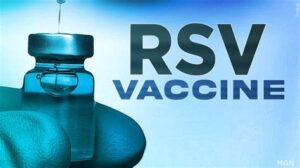Learn about RSV vaccine side effects, their severity, management tips, and when to seek medical attention for a safer vaccination experience.As the RSV vaccine gains momentum in the fight against respiratory syncytial virus, many people have questions about its safety and potential side effects. Understanding what to expect after vaccination is crucial for individuals considering this important preventative measure, particularly for vulnerable populations such as infants, the elderly, and those with compromised immune systems. This blog post aims to provide a comprehensive overview of the side effects associated with the RSV vaccine. From common reactions that might occur to the severity of those potential effects, we will also explore effective management strategies and clarity on when to seek medical attention. By equipping ourselves with knowledge about the RSV vaccine, we can make informed decisions and better navigate the post-vaccination experience.
Understanding RSV Vaccine Side Effects
The RSV (Respiratory Syncytial Virus) vaccine has been developed to protect individuals, particularly infants and seniors, from severe outbreaks of this common respiratory virus. However, as with any vaccine, there can be side effects that come with its administration. Understanding these potential effects can help you make informed decisions and prepare for any reactions.
- Pain at the injection site
- Slight fever
- Fatigue
- Headache
In rare cases, more severe side effects can occur. These could involve allergic reactions or other complications that may require medical attention. It is essential to monitor you
Common Side Effects to Expect
After receiving the RSV vaccine, individuals may experience a range of side effects. These side effects can vary in intensity and duration, but most are mild and resolve on their own within a few days. Understanding these common effects is crucial for anyone considering vaccination.
- Soreness at the injection site: This is perhaps the most frequently reported side effect, often manifesting as mild pain or tenderness where the vaccine was administered.
- Fatigue: A feeling of tiredness or low energy is common and can last for a day or two.
- Headache: Some individuals may experience mild headaches that typically resolve quickly.
- Fever: A low-grade fever can occur as the body’s immune system responds to the vaccine.
- Muscle aches: Generalized body aches can also be a reaction to the vaccine.
It’s important to note that while these side effects may be uncomfortable, they are generally not severe and should not deter individuals from getting vaccinated. The risks associated with RSV far outweigh these temporary discomforts. Always consult with a healthcare provider if you have any
Severity of Potential Side Effects
When considering the RSV vaccine, it’s essential to understand the severity of potential side effects that may arise following the administration of the vaccine. While many individuals experience only mild reactions, such as soreness at the injection site or a low-grade fever, it’s important to be aware that there can be higher severity reactions as well.
According to health professionals, most side effects associated with the RSV vaccine are temporary and self-limiting. However, in rare cases, individuals may experience more significant reactions resulting in hospitalization or the need for medical intervention. Commonly reported significant side effects include allergic reactions such as hives or difficulty breathing, which require immediate medical attention.
It’s crucial to monitor any changes following vaccination and recognize early signs of severe reactions. An effective way to manage these instances is by keeping track of your symptoms and reporting them to your healthcare provider promptly. Remember, while concerns regarding the severity of side effects are valid, the benefits of vaccination in preventing RSV often outweigh the risks associated with side effects.
How to Manage Vaccine Side Effects
When it comes to receiving the RSV vaccine, it’s common for individuals to experience some side effects. However, learning how to effectively manage these effects can improve your overall experience. Below are some strategies that can help alleviate the discomfort associated with vaccine side effects.
1. Rest and Hydration: One of the simplest yet most effective methods to manage side effects is to get plenty of rest and stay hydrated. Adequate sleep can help your body recover, while drinking plenty of fluids can help ease fever and keep you comfortable.
2. Over-the-Counter Medications: For mild to moderate pain or discomfort, over-the-counter medications such as acetaminophen or ibuprofen can be beneficial. Always consult with your healthcare provider for recommendations specific to your health needs.
3. Cold Compress: If you experience swelling or pain at the injection site, applying a cold compress can help reduce inflammation and provide relief. Make sure to wrap ice in a cloth or use a cold pack to avoid direct contact with the skin.
It’s essential to monitor your symptoms and note any unusual reactions. While most side effects are temporary and mild, knowing how to manage them can significantly improve your recovery experience.
When to Seek Medical Attention
After receiving the RSV vaccine, it is crucial to monitor your health and be aware of any potential side effects. While most side effects are mild and resolve on their own, there are specific circumstances when you should seek medical attention.
- Persistent high fever (above 103°F or 39.4°C)
- Severe allergic reactions, such as difficulty breathing, swelling of the face or throat, or a rapid heartbeat
- Unusual bruising or bleeding that isn’t explained
- Signs of infection at the injection site, such as excessive swelling, redness, or pus
- Extreme fatigue or weakness that lasts more than a few days
It is important to keep in mind that while mild side effects like soreness at the injection site or slight fever are common, persistent or severe symptoms may indicate a more serious issue. Don’t hesitate to err on the side of caution and consult with your healthcare provider if you have any concerns following your vaccination.
Frequently Asked Questions
What are the common side effects after receiving the RSV vaccine?
Common side effects can include mild pain at the injection site, fatigue, headache, and mild fever.
How long do side effects typically last after the RSV vaccination?
Most side effects are short-lived and usually resolve within a few days.
Are there any serious side effects associated with the RSV vaccine?
Serious side effects are rare, but allergic reactions may occur. It is important to seek medical attention if symptoms such as difficulty breathing or swelling occur.
Who should consider getting the RSV vaccine?
The RSV vaccine is recommended for infants, young children, and some adults at higher risk, especially those with underlying health conditions.
Can the RSV vaccine cause RSV infection?
No, the RSV vaccine does not contain live virus, so it cannot cause RSV infection.
Is it safe to receive the RSV vaccine if I have a compromised immune system?
Individuals with compromised immune systems should consult their healthcare provider to determine if the RSV vaccine is appropriate for them.
What should I do if I experience severe side effects after the RSV vaccine?
If you experience severe side effects, you should contact your healthcare provider immediately or seek emergency medical care.





